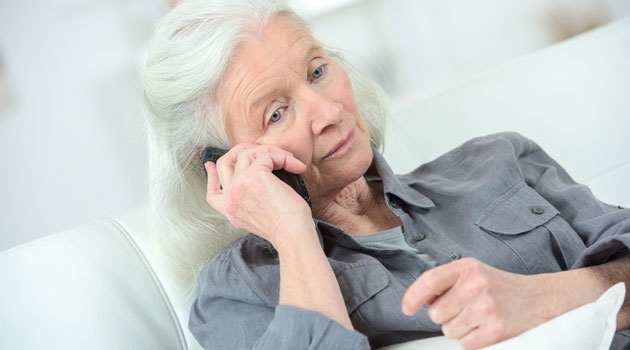Helpline important for older people during the pandemic
For many older individuals, the COVID-19 pandemic has resulted in the loss of daily anonymous contacts, such as small talk with unknown individuals on the bus or in shops. Calling a helpline can help fill this missing aspect of daily life. This is the finding of a summer 2020 study of calls to Äldrelinjen, a helpline for older people.
Social Work at Uppsala University.
Photo: David Naylor
“The most interesting finding was that individuals who call Äldrelinjen spoke of the loss of anonymous contacts with people who they did not have a personal relationship with but who provided confirmation of their existence. Äldrelinjen seems to have helped with this. Unlike other helplines that focus on specific problems, like anxiety, here you can call for small talk,” says Clara Iversen, a researcher vid Department of Sociology at Uppsala University. “The line has also offered a way to create abstract relationships, a sense of a larger ‘we’ that is united in the crisis.”
Äldrelinjen is run by the organisation Mind and has expanded its operations during the pandemic with additional volunteers. When the study was conducted in June-August 2020, 350 volunteers were linked to the helpline. The researchers received the participants’ consent to record 108 calls and of these, 64 that mentioned COVID-19 were chosen.
Important with superficial contacts
The researchers concluded that older people missed anonymous contacts during the COVID-19 pandemic. Several of them were very lonely. Previous research has shown that older people feel it is important not just with close relations but also having access to superficial contacts, explains Clara Iversen.
“This has to do with close individuals might disappear when you get older and then it is important to have this flexibility. And for individuals that have not been able to build up a social network of close relations for different reasons, it is very important to have undemanding relations.”
Has this changed much during the pandemic?
“Yes, older people are to avoid contact with others. There are many pensioner organisations, for example, that have closed, churches have closed, and you can’t go to cafes. Individuals also talk about being afraid of contact with their home care services. At the same time, there has been a change in society where home care services have become more focused on their tasks and have less time for small talk.”
Has an important function
The calls to Äldrelinjen show how the callers, together with the volunteers, try to understand the crisis and make it graspable. For example, this could be how they deal with interruptions in their daily routines – by adapted or critically re-evaluating.
Even as the study points to the vulnerability of older individuals when they lack close relations, it also shows a strength in the callers since they are actively working to maintain and develop anonymous relations.
“The study shows that Äldrelinjen has an important function, but we have not compared it with other activities or organisations. There is no research in Sweden on what role of these types of volunteer-based helplines play. But we do see that these undemanding contacts have an important function.”
Annica Hulth
Publication
Article in the journal Sociologisk forskning Tema: Covid-19-pandemin och samhället: A person among others? Older people’s understandings of their everyday life during the Covid-19 crisis DOI: https://doi.org/10.37062/sf.58.22100

